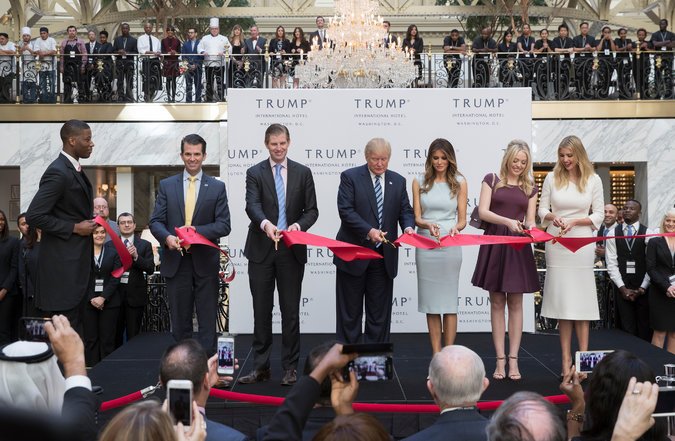(An analysis by the left-leaning Center for American Progress Action Fund concluded that the estate tax repeal could save Mr. Trump’s estate more than $1 billion, and those of his cabinet members $3.5 billion.)
Mr. Trump has stated, incorrectly, that the tax is crushing “millions of small businesses and the American farmer.” In reality, only about 80 small businesses and farms would fall under the estate-tax tent this year, according to the nonpartisan Tax Policy Center.
Republicans want to shrink the numbers further. In the Senate’s proposed tax bill, exempted income would temporarily double to $11 million per person — $22 million for a couple — during the next decade.
If those rules had been imposed last year, the number of estates owing money under the tax would have been no more than 2,204 — fewer than 0.1 percent of the total.
The House bill approved Thursday goes a step further, doubling the exemption for 10 years but then eliminating the tax. The result is that other taxpayers would have to make up the $151 billion cost over the next decade.
Opponents of the tax say fairness is at stake. No one — including billionaires — should have their assets taxed twice, once in life and once in death, the argument goes. But the issue is less about double taxation than no taxation.

Many of the assets held by the ultrawealthy are investments that are not taxed until they are sold. Pass along these investments after you die, and your family can pretty much avoid ever paying capital gains tax on them. That’s where the estate tax comes in.
Advertisement
Continue reading the main story
“It was a kind of imperfect substitute or surrogate for the capital-gains tax,” Wojciech Kopczuk, an economist at Columbia University, explained. “It’s a roundabout way of getting some revenue that escapes some other type of a tax.”
In the past, a reduction in the estate tax was always coupled with a plan to end the protective shell that encases inherited capital gains and keeps them from being taxed.
Newsletter Sign Up
Continue reading the main story
Thank you for subscribing.
An error has occurred. Please try again later.
You are already subscribed to this email.
“What’s unusual about the current bill is that when there’s been previous efforts to cut back or repeal the estate tax, there was also an effort to change the tax on capital gains,” said Michael J. Graetz, a Treasury official in the elder President George Bush’s administration and a co-author of a book on the estate tax.
The Republicans’ repeated success in whittling away at the number of people subject to the tax is both a marvel of marketing — with its relabeling as a “death tax” — and a testament to the outsize influence of wealthy donors on policy.
The modern version has been around for more than 90 years. One of its primary advocates was not a soapbox socialist but a Republican. Theodore Roosevelt, the first 20th-century president to endorse a tax on luxe inheritances, was the son of a wealthy socialite and an industrial baron. He warned that passing vast fortunes from one generation to the next not only undermines the recipients but “is of great and genuine detriment to the community at large.”
Over the past couple of decades, Republican efforts to shield more prosperous Americans from the estate tax have been increasingly successful. In 2001, estates worth more than $675,000 (nearly $1 million in today’s dollars) could be taxed at a top rate of 55 percent.
Now, the top tax rate is 40 percent of the amount exceeding $5.49 million. The effective average rate turns out to be much lower, — less than 17 percent, according to the Tax Policy Center — because of that multimillion-dollar exemption up front.
(Fourteen states and the District of Columbia have their own estate taxes, while six others have an inheritance tax, which falls on the beneficiary rather than the estate. Maryland and New Jersey have both, though New Jersey’s estate tax is scheduled for repeal on Jan. 1.)
Opponents of the tax have put a lot of money into fighting it over the years, without encountering much pushback, Mr. Graetz said, even from sectors that could be hurt by the change, like charitable organizations (since tax-deductible contributions are rendered less beneficial to rich donors) and insurance companies (whose policies become less essential to provide heirs with immediate liquidity or cash).
Advertisement
Continue reading the main story
The repeal effort is aided by the aspirations of dreamers and strivers who imagine that they, too, might reach the estate tax threshold by the time they die.
There is still hardly any organized opposition, even though the Republican proposal “basically allows you to escape not only estate taxes but also income taxes,” Mr. Graetz said.
For the handful affected, the stakes are enormous, he said, but for everybody else, “it’s just another increase in the deficit, which doesn’t seem to rally the public.”
Correction: November 16, 2017
An earlier version of this article misstated the top federal estate-tax rate under current law. It is 40 percent, not 39.6 percent, of the amount above $5.49 million.
Continue reading the main story
Article source: https://www.nytimes.com/2017/11/16/business/economy/estate-tax.html?partner=rss&emc=rss
Speak Your Mind
You must be logged in to post a comment.